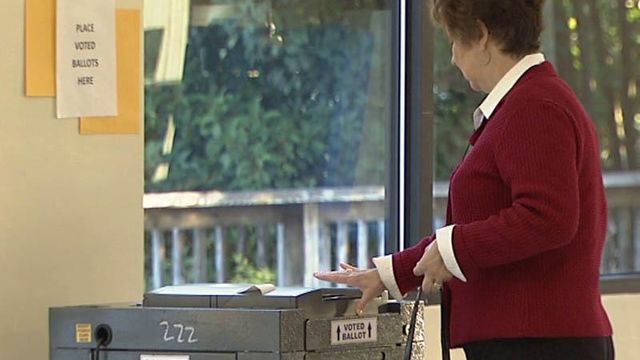Requiring ID to vote could leave some behind at polls
Republican lawmakers say requiring identification at the polls is a common-sense way to prevent voter fraud, but critics argue the move would open the door to discrimination.
Posted — Updated"People coming from out of state are somewhat flabbergasted of how little ID is required," incoming House Minority Leader Paul Stam said.
The incoming Republican leadership at the General Assembly plans to follow the lead of 27 other states that require some form of identification to vote.
"It's a no-brainer. People don't mind providing a photo ID. It's not a problem. They expect to do it. We ought to do it," said Sen. Neal Hunt, R-Wake.
Voting rights advocates acknowledge most people already need identification to get by in society, but they contend that voting is different.
"Driving or going to the bank, these are all privileges in society, whereas voting is a right," said Damon Circosta, executive director of the North Carolina Center for Voter Education. "We have to make sure whenever we're doing something with voting (that) we're taking into account everybody in the system."
The pending legislation would allow various forms of identification, including utility bills or bank statements, but lawmakers said they eventually hope to require a photo ID.
Neighboring South Carolina and Virginia accept a variety of IDs, while more stringent states like Georgia and Florida require a photo ID. Voters without one in those states can cast a provisional ballot, but it doesn't count until an ID is shown.
Atiba Ellis, a professor at West Virginia University who specializes in voting rights law, said research has shown a small percentage of voters don't have current identification.
"(It's) because they're poor, because they're elderly. (It's) largely also racial minorities," said Ellis, a native of eastern North Carolina. "How many people would be effectively excluded by those IDs?"
A study in South Carolina estimates 178,000 of the state's 2.6 million registered voters don't have a state-issued photo ID. North Carolina has more than 6 million registered voters, but there are no estimates as to how many lack a photo ID.
Bob Hall, executive director of political watchdog group Democracy North Carolina, said the state doesn't have a major voter fraud problem. It does, however, have a history of discrimination in voting requirements like the poll tax and literacy test, he said.
"We don't need an additional burden," Hall said. "(Restrictions like identification rules have) been done as a way to disenfranchise voters that the ruling party doesn't like. It's a power grab, and that's why this is very concerning."
Hunt called that allegation "ridiculous," saying that an ID requirement only ensures voters are who they say they are.
Wake County Board of Elections officials said the most common complaint they hear from voters is why people aren't required to show an ID to vote. State election officials said they don't plan to oppose House Bill 430, as long as it mirrors the current law that calls for some form of identification to register to vote.
"In terms of causing any major problems, I don't think it would," said Larry Leake, chairman of the State Board of Elections.
Leake said requiring a photo ID would create more complications. Court rulings dictate they must be provided free to voters, he noted, which would require extra money and staff.
• Credits
Copyright 2024 by Capitol Broadcasting Company. All rights reserved. This material may not be published, broadcast, rewritten or redistributed.





